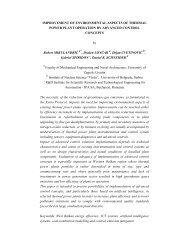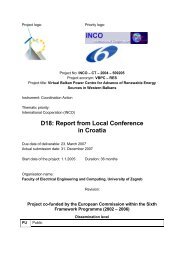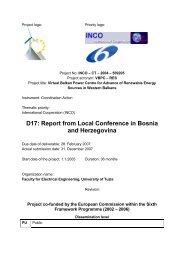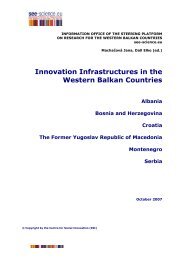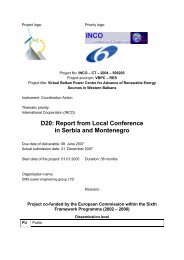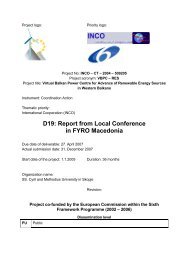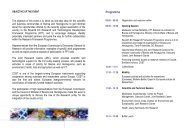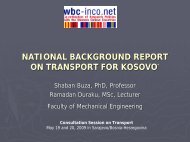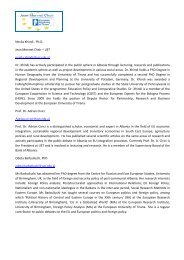Regional Balkans Infrastructure Study Transport - WBC-INCO Net
Regional Balkans Infrastructure Study Transport - WBC-INCO Net
Regional Balkans Infrastructure Study Transport - WBC-INCO Net
You also want an ePaper? Increase the reach of your titles
YUMPU automatically turns print PDFs into web optimized ePapers that Google loves.
!" # $ $ $%&<br />
• review and recommendations regarding information systems<br />
• perspectives of BOT arrangements<br />
The project comprised 10 distinct tasks, and in addition 5 special topics were<br />
studied, as shown below.<br />
Task 1: Mobilisation and review<br />
Task 2: Forecasting<br />
Task 3: <strong>Net</strong>work assessment<br />
Task 4: Methods of investment planning<br />
Task 5: Short-term investment plan<br />
Task 6: Project monitoring<br />
Task 7: Medium and long-term investment plan<br />
Task 8: Terms of Reference for "SEETO" (transport observatory)<br />
Task 9: Seminars and dissemination<br />
Task 10: Training<br />
Special topic 1: Road charges<br />
Special topic 2: Analysis of railway companies<br />
Special topic 3: Perspectives for BOT projects<br />
Special topic 4: Containerisation study<br />
Special topic 5: <strong>Infrastructure</strong> management systems<br />
During the implementation of the project, some additional tasks were defined,<br />
i.a. the establishment of the long-term investment requirements to raise the<br />
standards of the core road and rail networks, a brief study of the Sava river -<br />
based on existing information, and the presentation of an overview of the reform<br />
process - based on statements by the countries.<br />
Involvement of stakeholders<br />
The project was managed from the home office of the consultants, in close liaison<br />
with EuropeAid who is the contracting authority for the project.<br />
The development of regional transport strategies and the preparation for infrastructure<br />
investment clearly called for strong involvement of key stakeholders,<br />
including national authorities of the region and international institutions involved<br />
in the financing of transport projects.<br />
In order to ensure close liaison with national authorities the REBIS consultant<br />
established permanent offices in the five capitals of the region, each of which<br />
was staffed with an international Resident Economist and with local counterparts.<br />
In all countries the consultant's team included substantial local expertise.<br />
In order to ensure the appropriate involvement of the IFIs (International<br />
Financing Institutions) and the relevant General Directorates of the EU<br />
Commission, the project was supervised by the <strong>Infrastructure</strong> Steering Group<br />
(ISG) which is chaired by the European Commission (EuropeAid) and includes<br />
representatives from various parts of the Commission (DG TREN and DG<br />
17



